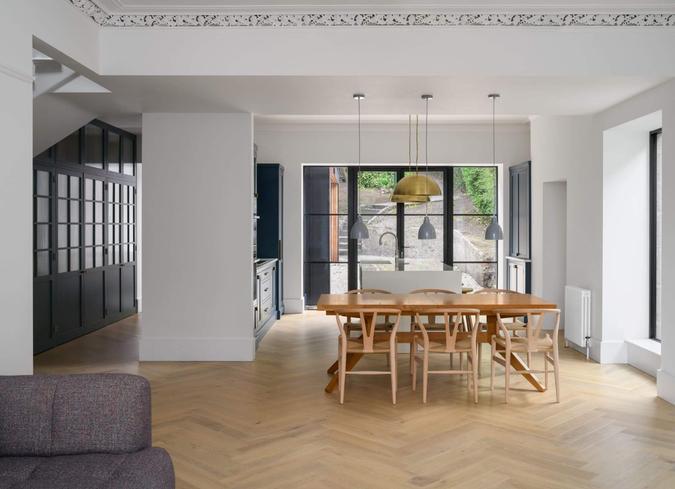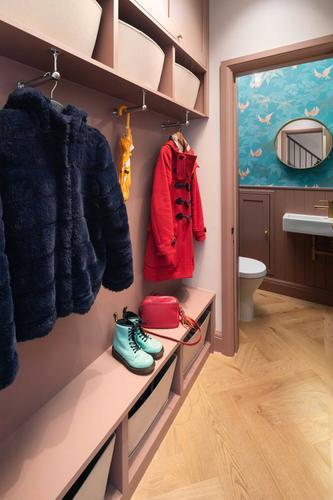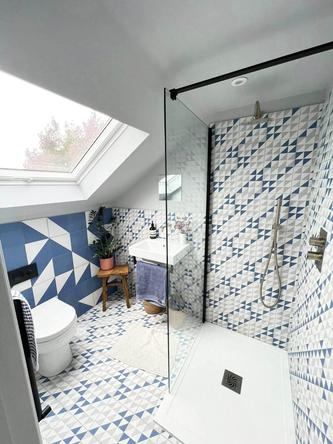Ever heard the phrase ‘tidy home, tidy mind’? Discarded toys, muddy shoes, paperwork and stuff that just doesn’t seem to have a place create visual clutter that studies have shown can increase your body’s levels of cortisol* – the stress hormone. For many of us, knowing where to start with how to declutter your home can be simply overwhelming. Here, we'll offer simple tips to help you reclaim your space and find peace of mind. But for some, a more dramatic intervention might be needed.
Consider collaborating with a builder to not only declutter but transform your home. Imagine: optimised storage solutions, improved layouts, and even expanded living space through extensions or loft conversions. It's an investment in both organisation and potentially, your property's value.
Ready to dive in? Let's explore both simple decluttering hacks and transformative home improvement options.
Tidying methods
There are a few approaches to take, but we recommend tackling one room at a time and going in with three bin bags or large containers:
- One for items to keep that don’t belong in that room
- One for donation to charity or sale
- One for rubbish / recycling
Try the following method for tidying up and see which one works for you:
Pile it up
Pull everything out into the centre of the room to sort through belongings, or out of the house completely if you have a lot of stuff (under a gazebo in the garden is ideal if it’s dry!) By taking everything away you can start again with a blank canvas, free up some space and see what space is available for storage.
Create categories
Championed by organisation expert Marie Kondo, this method declutters by category rather than by room, helping you to form good habits. To start, gather all clothes in a pile to start and don’t move on to the next category (which according to the ‘KonMari’ method is books) until you have decided what to keep and what to discard. As ‘does this item spark joy?’
One touch rule
If you don’t have time to pull everything out, pick a starting point in the room and work your way though each item. But once you pick an item up, don’t put it down until you have decided what to do with it. This is the anti-procrastination method for when you’re tight on time.

Once you know how you’re going to tackle the mess, it’s time to get started. Here are some organisation ideas for each problem area to help you declutter and organise your way to a stress-free home:
Hallway
It’s easy for hallways to become a dumping ground, but luckily it’s the smallest room to tackle so you’ll be able to declutter it in no time.

Creating a 'bootroom' zone in your hall can give you the storage you need. Project by London-based FMB member Hawksmoor Construction Ltd.
- If your hallway is tight on space, look for wall mounted options like pegs for organisation – they aren’t just for coats. Hang baskets to create a home for hats and scarves, keys or a place to grab a bag-for-life before heading out the door.
- Add a bench with storage for shoes if there’s room or give each family member their own basket near the door.
- Create a station for household admin. Find a spot for a rack to store unopened mail, any bills that need actioning, school raffle tickets etc.
- Under the stairs is a prime spot for clutter to gather. Find a local carpenter or joiner to add bult-in storage under your stairs – they can build bespoke shelving, create a mini-boot room, or fit concealed storage with pull out rails for shoes and coats.
Once you’re free of clutter, you could even think of adding value to your home with a useful understairs cloakroom.
Kitchen
Get everything out and spring clean those cupboards. Pull out appliances to sweep and mop underneath them. It’s time to get sorting...
- Throw out any food that’s out of date.
- Think about what appliances and equipment you use regularly. If you only use them a few times a year, they don’t need to be out on the worktops.
- If you lack cupboard space, think about where you can fit in some extra shelves, a small moveable island (with storage underneath) or racks.
- Decide on a storage system works for you. If you are a visual person, clear storage jars and open shelving could work for you. If clutter stresses you out, keep everything behind closed doors.
- Invest in kitchen cupboard risers so you can see what’s at the back of each cabinet – if you can’t see it, you won’t use it!
If your kitchen is still busting at the seams after a ruthless declutter a new kitchen might be on the cards. Alternatively, work with what you’ve got – reconfigure cupboards or build in extra storage above them. Refresh tired or dated cabinets with paint or new doors. Thinking structurally, could you speak to a builder about knocking through a wall or adding a door to outside to provide a better layout and flow?
Bedrooms
With constant cycles of laundry to contend with and the mess caused by busy morning routines, bedrooms can be a haven for clutter.
- Get everyone in your house involved with sorting their own clothes. Gather all clothes from wardrobes and drawers – include any clothes in the laundry pile and that stack of clean items you’ve been meaning to put away for a few days.
- Make a rule that if it doesn’t fit or hasn’t been worn it in the last 12 months, it can be sold, donated or recycled.
- Does it make you feel good about yourself when you wear it or have a practical use, like activewear or thermal layers? If not, let it go.
- You probably only need two sets of sheets and covers per bed. If you don’t have storage space for more, consider donating or recycling.
- Gather all miscellaneous items from drawers, surfaces and bedside tables.
- Get rid of make-up that’s out of date or that you don’t use and sample-sized toiletries. Unopened toiletries can often be donated to women’s refuges and other charities.
- Replace that chair you dump clothes on with a laundry basket or hanging rail.
- Decluttering kids’ toys and books can be a contentious issue. Whether you decide what to donate together or do it while they’re out, either way, it needs to be tackled and tidied.
- Think about condensing the volume of bulky toys – board games can be taken out of bulky boxes and kept in labelled zip wallets.
If your bedrooms are bursting at the seams, adding an extra bedroom to your home could be a more cost-effective solution to moving to a larger home. Go up into the loft, double height extensions to rear or side of your property, or even adding a garden room could give you the extra space you need, whether that’s a larger master bedroom (complete with walk-in wardrobe) or more space for a growing family.
Loft
What’s lurking in your loft? Chances are that once a box goes up there, you won’t see it again for years. Get the loft ladder out and set aside a day for tackling this hidden hotspot of clutter.

- Bring boxes down into daylight, check for evidence of damp or pests.
- If you haven’t used something in more than a year, it’s time to donate.
- Give sentimental items a second life – for example, mount photos in albums you can keep on a bookshelf downstairs or scan them to share with family.
- Pare back Christmas or seasonal décor, donating any you don’t use.
While you’re up there, take a look at the condition of your loft. If you can see your loft insulation – current government advice recommends a depth of between 250mm-270mm if it’s mineral or rock wool. If you have boxes lying directly on top, it will compress the insulation making it less efficient. Consider laying more insulation and boarding your loft to improve your home’s energy efficiency and save on heating bills. Find a quality local builder who can advise you with the FMB.
If you're looking for a more permanent solution to your space issues, take a look at how much space you have in your loft. Could a loft conversion offer you the chance to add breathing space as well as monetary value to your home?
Garage
Clutter gravitates towards garages, especially tools, garden equipment and bulk-buy items.
- Any power tools and garden equipment you don’t use can be sold on Facebook Marketplace or at a car boot sale, if it’s in good working order
- If you’re not sure what cables, screws or ‘thingummies’ go with what item now, you never will. Discard them.
- Add shelving if you have space and store items in see-though storage boxes, clearly labelled for easy access.
- Large items can be wall-mounted to keep the floor clear – like bikes, shovels and bulky sports equipment.
If your garage has seen better days – perhaps it’s damp or just uninviting – it could be time to think about investing in some improvement work. Concrete floors can be painted or overlain with specialist rubber garage flooring for a clean and easy to maintain solution. A lick of paint, better lighting or new garage door can give you a more useable space.
If you don’t use your garage, converting your garage into an insulated, useable room or knocking through to enlarge a kitchen or living space can be a very cost-effective way to increase the footprint of your home.
Find quality local builders
Finding a solution to your clutter can be a load off your mind, and finding the right builder to help can give you peace of mind that the job will be done right. At the FMB, all of our members have been vetted and their work has been independently inspected on site, so you can be sure they’re up to scratch.
Search for a local builder online today and start getting some quotes in for your next project.
* 2010 research by Dr. Darby Saxbe from UCLA, titled 'No Place Like Home: Home Tours Correlate With Daily Patterns of Mood and Cortisol.' explored the connection between household clutter and stress levels. It highlighted the psychological impact of living in a cluttered environment, specifically the feeling of loss of control and the added mental burden of managing the clutter.
